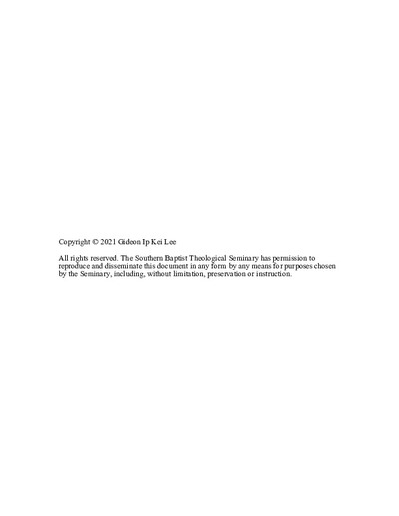Born Human Again: A Christian Response to Transhumanism Based on the Apologetic Approach of Francis Schaeffer
Subject
Transhumanism--Religious aspects--ChristianitySchaeffer, Francis A. (Francis August)
Good and evil--Religious aspects--Christianity
Technology--Religious aspects--Christianity
Abstract
Transhumanism, as explained by its proponents, is a philosophical and cultural movement that affirms the possibility and desirability of improving the human condition by modifying what it means to be human using science and technology. The transhumanist technological agenda is multifaceted and ambitious, ranging anywhere from enhancing the capacity of the human mind and body to slowing down aging, assisting reproduction, and simulating intelligence artificially.The methodology adopted in this study is inspired by the apologetic approach of Francis Schaeffer. The approach in this dissertation may be viewed as a contemporary adaptation of the way Schaeffer argued against existentialism. Implicitly, this work illustrates the apologetic approach of Schaeffer and demonstrates his continual relevance.
This study explains the emergence of transhumanism as an attempted solution to what may be called the problem of human evil. Highlighting the dilemma of human existence, Schaeffer turned the table around and reformulated the classical problem of evil into a problem for the secular humanists. The phenomenon of evil not only poses a problem for the theists who believe in the goodness and greatness of God, but it also produces much skepticism against the modern humanists who assert the goodness, rationality, and self-sufficiency of humankind. Transhumanists tacitly acknowledge the failure of secular humanism in establishing a defense of humankind, or an anthropodicy, but hold out hope that many evils will be eliminated as human nature is made perfect by natural or artificial evolution.
Picturing the apologetic approach of Schaeffer as a Y juncture engagement, this study responds to transhumanism in several steps. After a survey of transhumanism and an outline of the worldview apologetic approach exemplified by Schaeffer in chapter 1, chapter 2 probes where transhumanism originated from by examining its presuppositions in moral philosophy, epistemology, the philosophy of mind, and eschatology. Chapter 3 shows that transhumanism is deeply incompatible with widely-held intuitions about human equality, the universe, the mind, and the meaning of life. Chapter 4 points transhumanists to a better solution by translating the Christian gospel into a “re-humanist” metanarrative. Evil exists because life is a test of human dignity. Christians agree with humanists that evil is meant to be dealt with, not reasoned away. But transhumanism had been tried before by Adam and Eve. Precisely because of their failed attempt to become super-human, people are born post-human already. People will not overcome evil by becoming super-human. Instead, people must be born fully human again from above.

